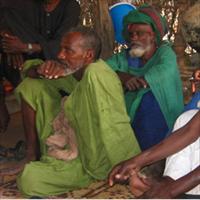MAURITANIA-SENEGAL: First refugees returning from Senegal get mixed welcome

As Mauritanian refugees started their historic voyage from Senegal today, some Mauritanians said they feared the return would only burden the country and the returnees.
"[Returns] should not be the priority right now,” said Khadi, a young man from Zouérat, the largest town in northern Mauritania.
He questioned how the country would support the returnees when already it struggles to provide basic goods and services to the existing population.
High global commodity prices sparked riots throughout the country last year as people found themselves unable to buy wheat products, a staple in Mauritania.
More than 70 percent of food in Mauritania has to be imported because the country’s poorly irrigated land does not provide enough to feed the population of 3 million.
According to 2006 World Bank figures, two-thirds of the working-age population are unemployed and according to the Mauritanian government’s 2006 poverty reduction strategy, almost half of all Mauritanians live in poverty, and a third in extreme poverty.
“People are suffering and we lack everything. We don’t have water, electricity or work. And we have to accommodate thousands more people! That's completely stupid," Khadi said.
Inter-ethnic tensions
Ethnic clashes with Arab Moors were behind the expulsion of black Mauritanians to neighbouring Senegal in 1989 by the Arab-dominated government of then-President Maaouya Ould Sid’Ahmed Taya.
Authoritarian Taya was overthrown in a coup in 2006 and the country held its first genuine elections in 2007.
Upon taking power in March 2007, President Sidi Ould Cheikh Abdallahi invited the Mauritanian refugees to return home.
According to a prominent Mauritanian journalist in Nouakchott, the returns threaten to stoke inter-ethnic tensions.
"The Arab nationalists are opposed to the returns," the journalist said.
“They fear that the return of the black Mauritanians will cause an unfavourable demographic imbalance. As a result, they are creating rumours to destabilise public opinion."
Government being rash?
The government downplays the threat of resurgent tensions over either ethnicity or resources.
"In accordance with the wishes of the Head of State, all Mauritanians who want to return can do so, and they will be well-received," pledged Yahya Ould Ahmed el Waghef, the Secretary General at the Presidency, in charge of the refugee returns.
Waghef is quick to brush aside the cynics. "It is true that a few months ago some people were sceptical… but today these sceptics are a minority,” he told IRIN.
“People have understood that every effort has been made to ensure that the returns take place under good conditions."
One observer said the government is acting rashly. "We must keep in mind that those responsible for the expulsion of 1989 are still in power today,” the observer said, requesting anonymity out of a concern that citizens do not enjoy free speech despite the new democratic government.
“Hence the reluctance to [engage too deeply with the issue] even among those in the same camp of President Sidi Ould Cheikh Abdallahi."
Returns process
Of the 35,000 Mauritanian refugees who settled in Senegal 18 years ago, 24,000 have expressed interest in returning home, according to the UN Refugee Agency (UNHCR), although the Mauritanian government has said it is expecting 15,000 to 20,000 returnees.
After several delays to the start-date, and with many questions still remaining, 115 black Mauritanians who have lived in Senegal for over 18 years, returned home via Rosso a town in the south-east that borders Senegal on 29 January.
The governments of Mauritanian and Senegal are working with UNHCR to run the returns process in stages, starting with 20 families.
While UNHCR and the UN World Food Programme (WFP) will provide the returning refugees with blankets, mosquito nets, basic sanitation supplies and food for three months, after this they will be left to support themselves.
Moussa, a black Mauritanian from the capital Nouakchott, said that it is after the UN agencies leave that the difficulties might become more acute.
"The refugees have not received any concrete guarantees,” he said.
“Will they find their [original] homes and land? Who will compensate them and how? In my opinion, this problem has not been dealt with thoroughly."
 Back and Next - Back and Next
Back and Next - Back and Next See Also - See Also
See Also - See Also